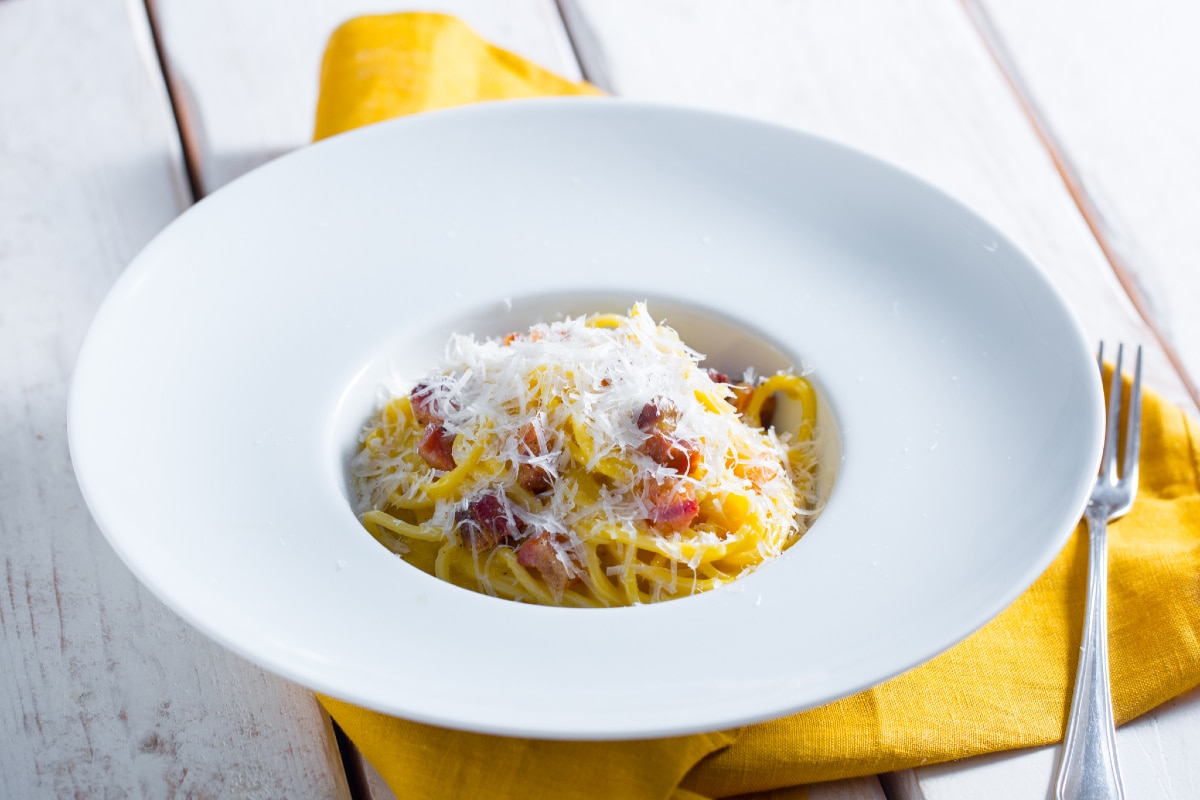Spaghetti Carbonara
- Easy
- 25 min
- Kcal 436

Golden strands of traditional carbonara stand out as a real favorite at family dinners – the glossy shine from eggs and cheese makes the creamy sauce look inviting. Authentic spaghetti carbonara always brings good vibes to the table with little pieces of crispy guanciale adding amazing pops of flavor to every bite...and oh man, the rich sauce that comes only from careful blending (not from cream!) always sticks nicely to every noodle. Since carbonara without cream focuses on the natural flavors of eggs, cheese, and guanciale, every forkful tastes just right – not too heavy, always DELICIOUS. Whether it’s a busy weeknight, relaxed weekend lunch, or special dinner with friends, easy carbonara earns praise for that melt-in-your-mouth feel and classic Italian flavor everyone knows and loves (and kids are usually all-in for seconds). Plates look so good with the shimmering sauce and little bites of cured meat scattered throughout, so even simple meals start to feel special with this one.
Home cooks love how spaghetti carbonara works for almost any occasion – big group dinners, school-night meals, even last-minute gatherings with neighbors. Since it uses familiar pantry staples, this authentic carbonara recipe creates a cozy, satisfying meal without a lot of fuss, but always with plenty of Italian charm. Busy families always appreciate a dish that’s both impressive and fast, and that’s pretty much the case every time you serve carbonara. Enjoy it with crisp salad, crusty bread, or just on its own...there’s really no wrong way (try adding peas or cracked pepper to switch it up). One nice bowl is really all you need to make everyone happy at the table. While some might switch the guanciale for other cured meats, sticking with the classic keeps the taste really close to what you’d eat in Italy, all while keeping dinnertime SIMPLE and actually enjoyable. Traditional carbonara checks all the boxes: flavorful, comforting, and always satisfying for families who just want something nice and genuine now and then.
You might also like:

To prepare Carbonara, start with the guanciale: from the piece of guanciale remove the pork rind and the peppery part, to prevent it from burning while cooking. Cut it into large cubes (0.2''x 0.2''). Place a frying pan on a warm stove and add the guanciale, simmer until brown without adding any other fat and bring it to a pink-gold color without burning.

Once the guanciale is ready, set it aside with its own fat.

Boil the water for the pasta. When it boils, add a little salt, and throw in the pasta and cook until al dente. Meanwhile, grate the Pecorino and Grana Padano cheeses. Place the grated cheese in a steel bowl. Crack the eggs, and add only the yolks.

Add freshly grated pepper. Start stirring with a hand whisk, then use a ladle to add a little pasta cooking water and stir some more. Now transfer the steel bowl to the pot of pasta water, placing a ladle so that a vent is left and the water does not escape.

Continue stirring with the whisk, and add a ladleful of cooking fat from the guanciale. To see if the cream is ready, the egg yolk must reach a temperature of 150°F (65°C) – to check you can use the “bowl scraper test”: dip a rubber bowl scraper into the cream, and run your finger over it to make a line, if the egg yolk doesn’t run, it’s ready.

When the pasta is also ready, drain it directly into the steel bowl, stir with tongs continuously, add cooking water as needed, toss and stir away from the heat. Finally add almost all the guanciale, add a little more cooking water, stir again and finish cooking on the bain-marie. Serve on a plate, finishing each portion with additional guanciale, more grated Pecorino cheese to taste, and a generous amount of ground pepper.